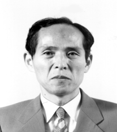
 Tatsuo Ishiguro Associate Senior VIce President NEC Corporation (Former Chairman,RWCP Management Board) |
What Is A Natural Interface For People? |

 Tatsuo Ishiguro Associate Senior VIce President NEC Corporation (Former Chairman,RWCP Management Board) |
What Is A Natural Interface For People? |
The recent explosive expansion of Internet is astonishing, considering its status just a couple of years ago. This surge in popularity is due partly to advances in computers, communication networks, multimedia and digital technologies, but also even more to the openness and novel framework of Internet, which has been evolving as an autonomous distributed network for over 30 years. In terms of actual applications, the WWW (World Wide Web) allows individuals to dispatch many types of information, meaning that Internet is revolutionizing the flow and exchange of information. This is reflected in the emergence of new information industies in the information society.
I.n the 21st century, everyone will be able to access various information over networks. Computers will be more extensively integrated into our daily activities, making our lives more comfortable. As the range of network communications expands, intelligent robots will support systems which grow more complicated, and play a significant part in the future aging society.
The role of the Real World Computing (RWC) is research and development of more human-oriented information processing technology. As computer networks become more transparent, systems and human-machine interfaces (HMI) must be improved and made easier to use. The objectives of the RWC research are to make the interface more understandable and natural for people, thus implementing a "Natural User Interface (NUI). "
People use various kinds of information media such as signs, symbols, voice, images, pictures, natural language, gestures and so forth, selecting the appropriate medium for a particular situation. Future systems will need to understand commands and demands from human users which are naturally expressed in our own language and motions. Systems will need to understand human behavior, deal with ambiguity and make correct judgments based on experience and accumulated knowledge; in short, they must be capable of complicated and advanced (flexible) processing.
Although researchers have been working on these challenges for many years, these technologies are still in the early stages. Fortunately, LSI technology continues to develop and information processing performance will continue to increase, thus facilitating the processing of large volumes of complicated information. The key mission is to create entirely new concepts and breakthroughs for flexible technologies.
The technologies are wide-ranging, and we do not have even a clear and widely accepted concept of what is good in "being natural". We must therefore remain focused on the goal to establish a fundamental framework of novel information processing that will assist society and human activities in the future.
I firmly believe that these breakthroughs will form the infrastructure of industrial and social development in the 21st century.